- Home
- Cassidy Cayman
Endearing (Knight Everlasting Book 1) Page 2
Endearing (Knight Everlasting Book 1) Read online
Page 2
If you’re reading this, you’re dead.
Chapter 2
Sir Tristan Ballard rode wearily over the dried mud, sorry for his horse and beginning to feel the inklings of pity for himself. His squire and most trusted friend Brom looked half-dead in his saddle and they still had miles to go before they reached their new liege’s castle.
It wasn’t a long journey, but they were both injured from the skirmish that had erupted when a small band of outlaws foolishly tried to lay claim to his new property. Word must have not properly spread that even though Sir Andrew had died without an heir, Dernier Keep was not up for grabs.
Sir Andrew had been like a father to him, taking him on as a squire when his own father had gone bankrupt and fled for France in the hopes of regaining what little he’d lost. When word came back that his father had taken up with the wrong lot and had perished in a tavern brawl, reportedly after being caught trying to cheat the proprietor, his mother had died of a broken heart. Why she’d continued to love the base, cowardly man was beyond Tristan’s comprehension, even at the tender age of seven when he found himself an orphan.
Sir Andrew had been everything he aspired to be; honest, fine, and fierce in battle. He was so grateful not to be judged by his weak father, but by his own accomplishments, Tristan became something of an overachiever and was knighted at only fifteen. He’d never once let Sir Andrew down. So, it was no surprise to him that his beloved foster father, mentor, and friend had left him the keep and its lands.
Everyone around him thought he should be delighted to be in charge of such good farmland and such a sturdy, though small keep, but his grief at losing Sir Andrew hadn’t left him yet. Andrew’s death had been sudden and, worse, Tristan had been away and hadn’t gotten to say goodbye or thank you, or ask what he was supposed to do.
Though it choked him with ungratefulness to admit it, he found being a lord of the manor a burden and would have rather continued battling under Sir Andrew’s name. Now, he’d have to send men off to keep the crown safe and be stuck at home tending … he wasn’t quite sure what, and that was part of the problem.
It might have been easier if infidels didn’t keep thinking they could lay claim to it. He wondered how many more men he’d have to kill before word spread that the land was his. Having to make this journey to Sir Walter Grancourt’s castle to assure that man of his continued loyalty, as Sir Andrew had always done, was not just an inconvenience, but dangerous, considering it seemed everyone who’d ever admired Dernier from afar thought they could take it for themselves. He’d left it well guarded by his most trusted men and the trip should only be a fortnight, but he would have felt better staying at home for now.
“You’ll have to get married,” Brom said suddenly, reaching around in his bags for a small, dried up apple. He took a bite and offered the rest to Tristan, who shook his head at the unsavory offer. Even more unsavory was Brom’s opinion.
“I daresay I won’t,” he countered. But his squire, only a year younger than him, wasn’t an idiot and wouldn’t say such a thing if he didn’t have a good reason. “But what makes you think so?” Tristan asked, feeling another burden settle onto his shoulders.
“Look at the trouble not having a legal heir caused Sir Andrew,” he said, taking another bite of the apple. “Look what trouble it’s causing you now. It’d be better to get a few honest brats out into the world so when you go, people can rest easy on who owns the place.”
“Well, I suppose if I were to die without an heir, it would all go back to Sir Walter,” Tristan said reasonably. He’d never met the man, always being out on campaign when Sir Andrew made his visits. But Tristan didn’t have anything against being a vassal to Sir Walter. He was, by all accounts, fair and had never shirked his duties when it came to war. “And anyway, I don’t plan on ‘going’ any time soon.”
“One never knows.” Brom grinned, then quickly straightened his face when he saw Tristan’s dark look. It was too soon to be making such jokes. Sir Andrew had probably thought the same thing, and it was only by good fortune that he’d thought to make a will naming Tristan as his heir. “And Tristan, it’s very likely someone’s going to come forward and contest it, try and convince the king the land should be theirs. It’s best to make a good impression on Sir Walter in case that happens, as he’ll have a say in the matter.”
“I don’t intend to insult Sir Walter,” Tristan grumbled. Then he sat up straighter in his saddle, despite it pulling on the wound in his shoulder. “You cannot mean I should try to marry one of his daughters? It’s daughters he has, correct?”
“Two of them.” Brom tossed his apple core and rubbed his hands together as if eager to tell a tale. “One is sickly and the other bad-tempered. From what I was told, they’re both past their prime, but Sir Walter is loath to let them go since his wife died only a year or two ago.”
“Then I shall not trouble him by taking one of them now,” Tristan said, shaking his head.
Brom had a straight face, but he felt like he was being teased. However, Brom wouldn’t drop the subject and, with a dawning sense of horror, realized that his squire honestly thought it was a good idea that he try to marry one of his new liege lord’s daughters.
“If you mean to hold on to Dernier Keep and its lands, I strongly advise it, sir,” Brom said.
Tristan turned and stared at the man. Brom never called him sir except in the direst of circumstances. They’d grown up together and were as close as brothers. Brom performed all his duties without a twitch and usually before he was asked. So Tristan had never seen any need to force protocol because he’d been knighted and Brom had not felt the need for that rank yet. He was the sort who liked more work and less responsibility, and sometimes Tristan envied him.
“Do you truly fear we may lose the land?” he asked.
As much as he didn’t relish the thought of taking over its day to day running, he couldn’t abide losing it. It was his home, and Sir Andrew had thought it was right for him to have it. Since he was seven and the man had taken him in, Tristan had always done what Sir Andrew thought was right.
“I do fear it,” he said. His usually merry face was grim.
“Sickly and bad-tempered, you say?” he asked after a long moment of pondering. “I suppose it would be too much to ask that one at least be fair of face?”
“That, I have not heard either way.” Brom wearily turned to see the men that were traveling with them had begun to lag behind and he whistled shrilly for them to keep up. “Let us pray it to be so.”
Chapter 3
Fay gasped at the words and pushed the book away, her hands going cold. If this was a joke, it was a poor one, and she would let whoever was in on it know in no uncertain terms when she found them. Still confused about what had happened, she finally reached out for the scroll. The parchment was crackly and she worried about it disintegrating in her hands. But holding it made her feel compelled to unroll it for some reason. Anything would be better than that ominous single line in the book. The writing was impossibly ornate, and in horrible old English to boot, but something kept making her squint and strain to make out the words, finding they were quite simple once she stared at them for a while.
True love and faithfulness are but a lie.
Prove me wrong, you must now try.
Fail, return the gown in which I was betrayed,
And in your grave you will for certain lay.
The very parchment seemed to burn her icy fingers and she tossed it aside. She was about to get a serious case of the creeps if she didn’t calm down. She needed to stop wasting time and find out where she was, let her uncle know she was all right, and, possibly, wander around the crowd so they could get a look at the dress they hadn’t gotten to see in the show.
She pushed back the chair, the legs tugging on the rough rug, and looked around, then looked down. Nothing was right, starting from the rug, a simple woven thing, but it hadn’t been there before, of that she was sure. The only things in the room were
the bedframe and the rolling rack. And the chest, she reminded herself. The chest she’d found the gown in. That was still there, sitting in the corner, under a spindly-legged table with an array of bottles and jars on it. The stone walls were decorated with tapestries, their colors rich and vibrant. The very stones looked almost shiny. In all the corners lay small, neat piles of what looked like straw with herbs mixed in, almost like potpourri.
The bedframe was still there. Now it not only had a mattress on it, but was covered in bedding and layers of rich fabric hung from its canopy. Sweet, embroidered slippers were set on a wooden step near the side of it and a heavily-carved table stood next to it. Feeling dizzy all over again, Fay stood and walked to the bed, climbing the step and sitting down. The mattress was soft and she sank in enough to make her grab at the edge to keep from ending up on her back.
Now, she noticed that the metal rolling rack was gone, replaced by a double door cabinet that almost touched the ceiling. The windows were no longer just crumbling rectangular holes in the wall, but had thick panes that slightly distorted the weak rays of sun coming through them. Another table, this one round, with two more chairs around it completed her quick furniture inventory and, with utter disbelief, she pulled herself off the bed and walked the circumference of the room, touching everything. The doorway that had led to a tiny, empty room now led to a tiny, furnished room with two single, neatly made up beds and another tall cabinet crammed in. She finally came to the little closet that had the curiously boarded up floor and opened that door.
“No,” she said, slamming the door shut. “No way in hell.”
Opening the door again she was faced with what could only be a rudimentary form of toilet. A wooden bench with a hole in it was fastened across the middle of the closet. When she leaned over and peered down the hole, she saw straight down to the ground below her. A jar stuffed with dried herbs sat on one side of the bench and a pile of cloth scraps sat on the other. That little closet was now the loo.
No, none of this was right. Her uncle had given her a tour of all the habitable rooms of the castle ruins and not one of them had looked like this. The only furniture was on the ground level, and that was mostly modern, brought in for the show and the auction. There were a few tapestries that had been donated, but Uncle Randolph was still working to get the castle restored, let alone furnished, just yet.
She looked back at the table, at the open book and the scary scroll. With a pounding heart, she slowly crossed the room and sat down heavily in the chair.
If you’re reading this you’re dead.
It didn’t make any more sense than the first time she read it. With shaking hands, she picked up the book and turned it over, examining the cloth cover and the sewn in pages, all of them different sizes and varying textures, not like any paper she’d ever used, but not crackly and rough like the parchment. It reminded her of the handmade artsy journals her aunt had loved collecting, but without any of the charm.
When she set it back down, it flopped open to the same page. Once again, the cruel message made her stomach plunge. She turned the page and saw a jumble of words crammed onto it and realized with a jolt that she could easily read the writing. Though there were a few ink spatters here and there, it wasn’t the ornate, heavy-handed script of the poem. It was simple, modern handwriting.
You’re cursed. The whole castle is cursed. The moment you laced up the gown you were dead to all those who know you in your own time. As far as I can tell it’s 1398. It’s always 1398.
I’m so very sorry, but I couldn’t face doing it again. This time will be my last. I no longer judge those before me for failing. I hope, one day, you’ll no longer hate me for giving up.
I honestly thought it would be me to break the curse, just as everyone before me must have thought the same. If you’re smart, you’ll put the gown back in the chest and end it before your heart breaks too many times to count.
But you’ll try. We all did. Good luck.
Fay was to the point that she could admit to herself she was freaking out. She’d come to terms with the fact that she was in the same room of the same castle that she’d fainted in, but everything was different. What had happened to her? She stared at the letter until her eyes crossed and the words swam on the page. She ran her hands over it, wishing she had paid more attention all the times Uncle Randolph had dragged her to one museum or another. A stab that she might never see him again, that he might believe she was dead, hit her square in the chest. He would know exactly what kind of paper it was, how it was made. He would have taken one look at the chair she was sitting on and probably known what year it was made just by the shape of its legs.
“Do I believe it?” she asked aloud.
Did she now believe that she was in another year? Yes, she did. All of a sudden, at that moment, she did.
She reread the poem and the letter, deciding it was the gown that must be cursed. It not only cinched her uncomfortably in the waist and made her itchy, now it made her blood curdle with fear. She wanted the damn thing off as quickly as possible and yanked at the laces until she was able to get it over her head. She stood in her twenty-first century underwear, wondering what to do with the wretched dress.
“It can’t go back in the chest,” she muttered, not feeling the least bit crazy for continuing to talk to herself. She was far beyond crazy if she believed she was truly cursed into another time. According to the curse itself, if she put the gown back in its chest, that would mean she’d failed. “And in your grave for certain lay,” she repeated the last line of the poem. “Nope, won’t be doing that.”
She shuddered and let what she’d previously thought of as beautiful fabric slide to the floor in her horror. The person who’d written the letter had put it back. Was she dead now? Dead for real, not just in the time she’d been stolen from?
“And what did she fail at?” Fay wailed, clapping her hand over her mouth when her upraised voice echoed in the high-ceilinged room.
Panic was beginning to take hold and the only thing that kept her from sinking into a sobbing puddle on the floor was the fact that she was only wearing her knickers. For some reason, she didn’t want to be found by whoever actually belonged in this castle while she was in her granny panties and sports bra.
The wardrobe. The big cabinet had to be a wardrobe. She strode across the room, oblivious to the chill, and flung open the doors to find it packed with more dresses and capes. A neat row of slippers stood at attention at the bottom and a rack above the gowns was packed with what looked like scarves and shawls and, possibly, headwear.
The sight soothed her, making her think of when she used to be a salesperson at Finley’s, the huge department store she’d worked at since she was seventeen. Now she was up in accounts and never had to hang or fold anymore. But she’d liked doing those things back then, found it therapeutic. She realized she would have to think of her current job in the past tense as well now. It was one thing that didn’t torment her. It had been a job, not a passion. She still hadn’t found her passion yet, and was only happy to be able to pay the bills, not be a burden to her aunt and uncle. She’d even been able to help them out a little when Aunt Terrie was diagnosed.
It was a much needed respite to her terrorized mind to flip through the dresses, finally choosing a pale gray one with a blue underdress. She wished she knew the proper words for everything and, once again, missed Uncle Randolph. She shook off the sadness, feeling like she didn’t have time for it. Sooner or later, someone would discover her. What happened then, she had no idea, but the dread of it made her turn back to the desk in hopes of answers.
Sick of looking at the poem, she rolled it up and stuffed it behind the shoes in the wardrobe, then saw the cursed dress still lying on the floor. As much as she never wanted to touch it again, she couldn’t risk it ending up in the chest. If it really caused her to die and some other unlucky soul to get dragged into her place, then she could never allow that to happen. Taking a deep breath, she grabbed it and put i
t in the farthest corner of the big cabinet, pulling a thin coverlet off the bed and draping it over the dress. Satisfied that it was fully hidden, she returned to the book.
Vellum. She was almost positive that was what the pages were and, if she remembered correctly, that it was made out of animal skins. Well, that was the least of her worries and, after scowling at the apology note one last time, she flipped to the first page.
“Begin at the beginning,” she told herself. “There’s an answer to every question.” Before she mindlessly babbled every trite bit of advice she’d ever learned, she hunkered down over the book, but the words of the poem kept swimming in her mind.
It was fairly clear that the writer of the poem and, Fay supposed, the person who’d placed the curse, didn’t believe in true love. The second line had said she had to prove that wrong or she could give up and let another person try, but then she’d be in her grave. She took a deep breath and blew it out, forcing herself to focus and read the first page. There was a neat, bullet-pointed list of names and short descriptions, a cheat sheet to remember them by. Good, she’d know the cast of characters in this play she was forced to act in.
Me—younger daughter. They knew my name. I suppose they knew everyone else’s as well.
Sir Walter Grancourt—father, tall and portly, white hair, beard
Anne—older sister, don’t get attached
Batty—my maid, brown hair, big eyes, very sweet
There were several names that came after Batty’s that were so thoroughly crossed out, the paper had been torn and the ink was smeared as if it had gotten wet. What had happened to those people? Did she want to know? Just at that moment, the door flew open and a young woman who looked to be close to Fay’s age poked her head in. She was dressed in a simple, dark blue gown with flowing sleeves and a pale gray underdress. She had brown hair pulled back in two twisted braids with curly tendrils peeking out from under a kerchief and big eyes that almost twinkled with good cheer as she smiled.

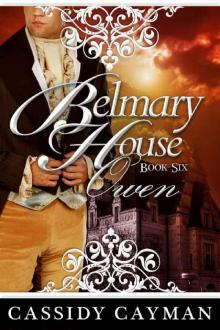 Belmary House 6
Belmary House 6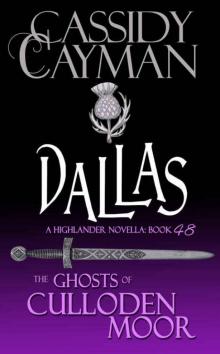 Dallas
Dallas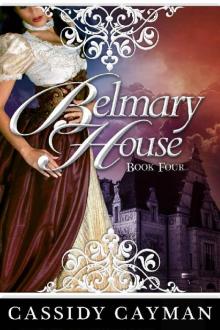 Belmary House 4
Belmary House 4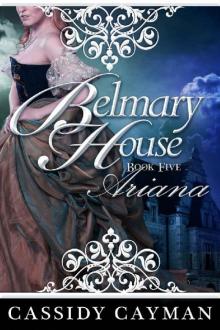 Belmary House 5
Belmary House 5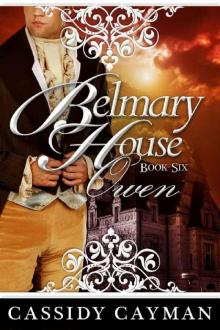 Belmary House Book Six
Belmary House Book Six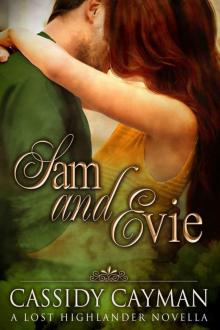 Sam and Evie - A Lost Highlander Novella
Sam and Evie - A Lost Highlander Novella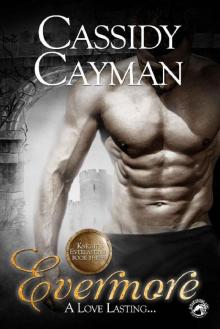 Evermore (Knight Everlasting Book 3)
Evermore (Knight Everlasting Book 3) Lost Highlander
Lost Highlander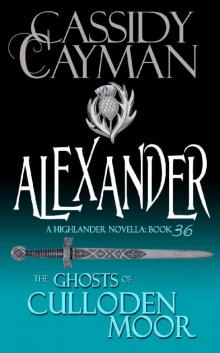 Alexander: A Highlander Romance (The Ghosts of Culloden Moor Book 36)
Alexander: A Highlander Romance (The Ghosts of Culloden Moor Book 36)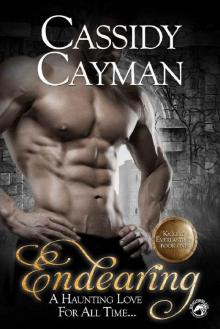 Endearing (Knight Everlasting Book 1)
Endearing (Knight Everlasting Book 1)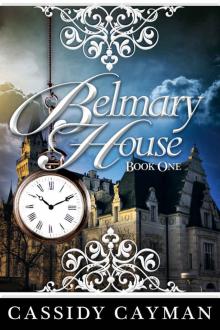 Belmary House Book One
Belmary House Book One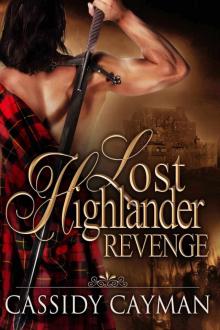 Revenge (Book 3 of Lost Highlander series)
Revenge (Book 3 of Lost Highlander series)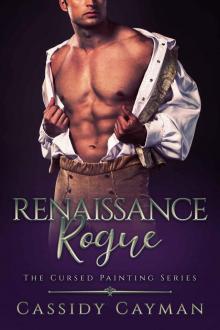 Renaissance Rogue (Cursed Painting Book 3)
Renaissance Rogue (Cursed Painting Book 3)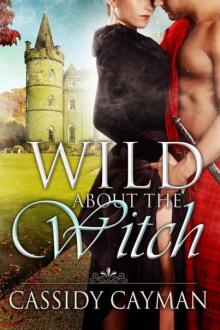 Wild about the Witch
Wild about the Witch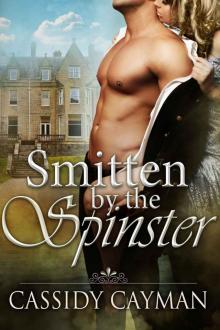 Smitten by the Spinster
Smitten by the Spinster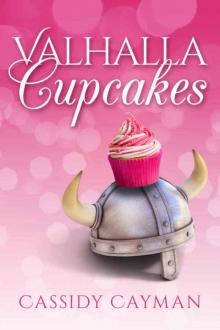 Valhalla Cupcakes
Valhalla Cupcakes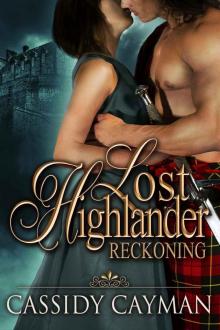 Reckoning (Book 4 of Lost Highlander series)
Reckoning (Book 4 of Lost Highlander series)